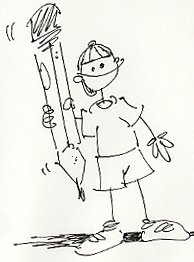Reading the Movies
"Read as many scripts as you can"
Beginning screenwriters hear it all the time, but let me tell you, it's good advice.
Really good advice.
It's not that I didn't put stock in the advice (I mean, how can reading lots of scripts not make one better at writing them?) but I did severely underestimate the impact that reading lots of scripts would have on my own writing.
Early on, I think I placed too much emphasis on watching gobs and gobs of movies (or on reading all those highly recommended "how-to" books) and too little emphasis on simply reading as many scripts as I could get my hands on. I'm also more or less continuously involved with a novel, so there is the issue of time. When I did read scripts, I'd try to be too selective (I wanted to read the very best ones) or I'd find myself embroiled in ridiculous, irrational fears. For example, I'd be halfway through a poorly written script and think "Wait a minute: I'm still a beginner. I'm still developing and growing. What if I continue plowing through this horribly executed script and I somehow subconsciously absorb some of these bad habits and incorporate them into my own writing?"
Of course, the absolute best way to get better at writing screenplays is simply by doing it. Writing and rewriting. Day in and day out. That's always been the case and always will be. But the importance of reading the screenplays of other writers should not be overlooked.
If you're eager to start reading screenplays, you need to understand that the positive effects of reading lots of them can take some time. It's a cumulative process. You might learn some great things right away from reading your first good (or not so good) screenplay but the real benefit is probably going to show up a bit further down the road.
AMERICAN BEAUTY was the first script I picked up after making the decision to try screenwriting seriously. I read it and reread it. I could come away from that script and see instantly where my own script was lacking. I learned a lot about formatting. It's a heck of an example to compare your work to. But it wasn't until much later, after I had read large amounts of vastly different works, works as different from one another as ADAPTATION and GROUNDHOG DAY, that the light really came on. It's a phenomenon you hear people talk about again and again but you never really understand it until it happens to you.
I still watch lots of movies. I've also learned quite a bit from some of those "how-to" books (Robert McKee's STORY and Lajos Egri's THE ART OF DRAMATIC WRITING have been particularly helpful to me) but I make it a priority now to read one or two scripts a week.
As a more established screenwriter once said in his blog: "One script a week is fifty-two a year!"
Beginning screenwriters hear it all the time, but let me tell you, it's good advice.
Really good advice.
It's not that I didn't put stock in the advice (I mean, how can reading lots of scripts not make one better at writing them?) but I did severely underestimate the impact that reading lots of scripts would have on my own writing.
Early on, I think I placed too much emphasis on watching gobs and gobs of movies (or on reading all those highly recommended "how-to" books) and too little emphasis on simply reading as many scripts as I could get my hands on. I'm also more or less continuously involved with a novel, so there is the issue of time. When I did read scripts, I'd try to be too selective (I wanted to read the very best ones) or I'd find myself embroiled in ridiculous, irrational fears. For example, I'd be halfway through a poorly written script and think "Wait a minute: I'm still a beginner. I'm still developing and growing. What if I continue plowing through this horribly executed script and I somehow subconsciously absorb some of these bad habits and incorporate them into my own writing?"
Of course, the absolute best way to get better at writing screenplays is simply by doing it. Writing and rewriting. Day in and day out. That's always been the case and always will be. But the importance of reading the screenplays of other writers should not be overlooked.
If you're eager to start reading screenplays, you need to understand that the positive effects of reading lots of them can take some time. It's a cumulative process. You might learn some great things right away from reading your first good (or not so good) screenplay but the real benefit is probably going to show up a bit further down the road.
AMERICAN BEAUTY was the first script I picked up after making the decision to try screenwriting seriously. I read it and reread it. I could come away from that script and see instantly where my own script was lacking. I learned a lot about formatting. It's a heck of an example to compare your work to. But it wasn't until much later, after I had read large amounts of vastly different works, works as different from one another as ADAPTATION and GROUNDHOG DAY, that the light really came on. It's a phenomenon you hear people talk about again and again but you never really understand it until it happens to you.
I still watch lots of movies. I've also learned quite a bit from some of those "how-to" books (Robert McKee's STORY and Lajos Egri's THE ART OF DRAMATIC WRITING have been particularly helpful to me) but I make it a priority now to read one or two scripts a week.
As a more established screenwriter once said in his blog: "One script a week is fifty-two a year!"


0 Comments:
Post a Comment
<< Home